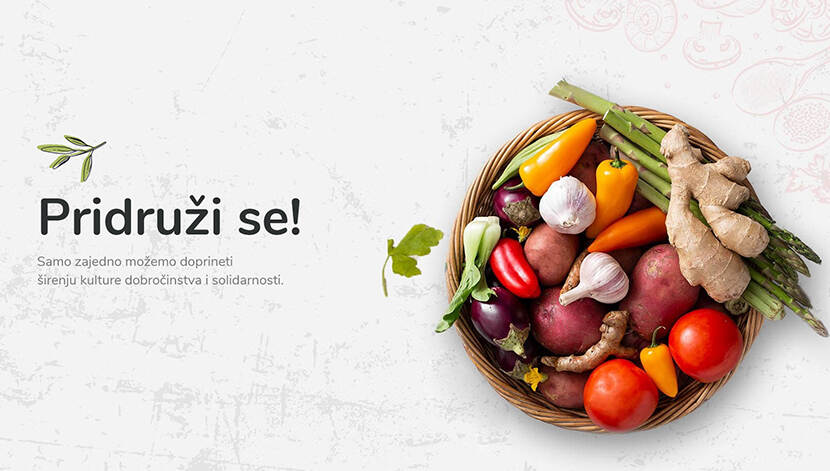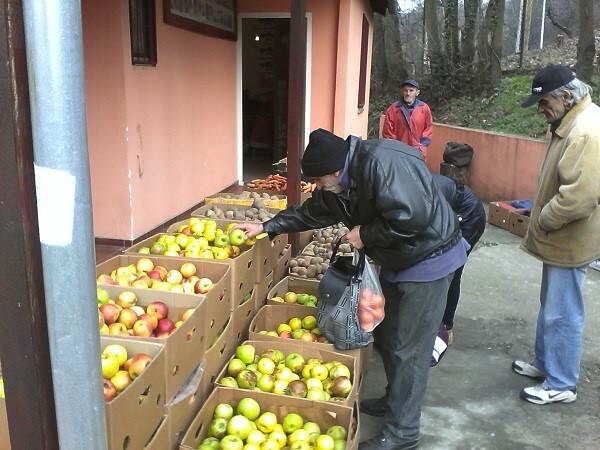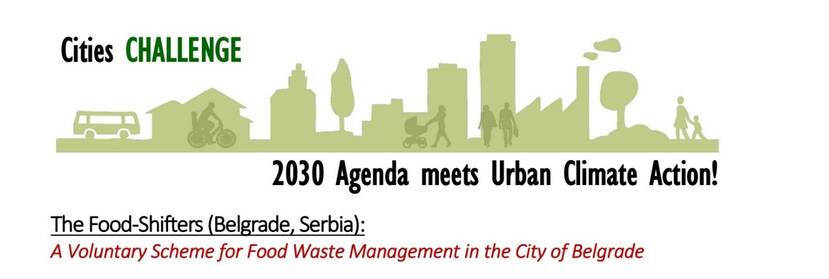Serbia: Food waste reduction with better supply chain management
See the situation in Serbia - And the efforts taken to tackle the issue of food waste.
| The Dutch version of this article was published in the latest Agrospecial Global approach to food losses. |

Food waste in Serbia
Annually 770.000 tons of food is wasted or lost in Serbia, thereby causing serious environmental problems while socio-economic development possibilities are missed out on. About 90% of the total waste still ends up in the landfills, wasting valuable resources despite resource scarcity and poverty in the country. According to the estimates, diverting food waste from landfills can save 580 kg CO2er per each ton. However, awareness of the problem is very low among the relevant stakeholders. From the agriculture value chain, as well as and especially from the retail sector such as hotels, restaurants and cafes, food that is still usable for consumption and could instead be reused, ends at the landfills.
How much is wasted?
The data from February 2020 shows that 1.8 million out of about seven million people in Serbia live on the edge of poverty, but nevertheless, those who have, throw away 350,000 tons of food annually, or 35 tones per capita. The hospitality sector usually orders some 120,000 tons of food, and one-third ends up in landfills releasing large amounts of harmful gas instead of being used to produce energy or compost.
According to the survey that included 50 health institutions with a secondary and tertiary level of health protection, as well as 200 hospitality outlets, conducted by NALED and GIZ, only a fifth of respondents knew what food waste is and how it is properly managed to minimize the harm done to the environment. A fifth of the respondents throws leftover food directly in municipal waste containers, after which it is taken to a landfill. The second most common thing to happen to food waste is being used as animal feed, composting is third, while generating energy is fourth. The survey shows that hospitality outlets produce some 8 kg of food waste per day, while health institutions in which food is prepared and served produce up to 28 kg every day. About 65% of caterers and employees in health institutions separate waste from food, and 19% of companies and institutions admit that they throw that waste in a container. Most institutions in which food waste is not adequately disposed say they need appropriate infrastructure, a binding legal framework, but also some incentive policies that would reward proper waste management - tax reduction or tax-free waste disposal.

management could help Serbian hospitality establishments save financially while contributing to a reduction of environmental pollution. Serbian hospitality establishments order around 120 thousand tons of food in a year, with around 40 thousand tons ending up as waste – 25 thousand tons in kitchens and around 15 thousand tons on plates left behind by customers. If hospitality establishments would plan ingredient purchases and portion sizes more properly while also appropriately separating animal waste from vegetable waste and handing them over to an operator, hospitality businesses would not only see financial benefits, but would also be fully recognized as socially responsible companies, given that waste that ends up on a landfill emits dangerous greenhouse gases (GHG).
Initiatives to reduce food waste
In order to appropriately handle the food waste problem in urban areas National Alliance for Local Economic Development (NALED) has initiated the project "Towards Better Food Waste Management in the Republic of Serbia" implemented within the develoPPP program financed by German Federal Ministry of Economic Cooperation and Development BMZ and implemented by Deutsche Gesellschaft für Internationale Zusammenarbeit (GIZ) GmbH. The aim is improving the management of this type of waste, creation of regulatory solutions and governing the bio-waste flows. Food leftovers may have highly adverse effects on people's health by reappearing in the food chain (e.g. animal nutrition) or by reaching landfills where they are emitting harmful gases with greenhouse effect.

In July 2020, GIZ started with the introduction of a new and innovative approach to climate-related local challenges by the implementation of “The Food Shifters: A Voluntary Scheme for Sustainable Food Waste Management”, a yearlong pilot project to be implemented in the City of Belgrade. Cities like Belgrade lack adequate food waste management systems, which would include systematic monitoring of food waste generation along the value and distribution chain compared with solutions for waste prevention, reuse and redistribution. Such food waste management, could not only reduce GHG-emission but also facilitate the reuse of valuable natural resources for socioeconomic benefits, i.e. increased food security among vulnerable inhabitants.
Another initiative is taken by Food Bank Belgrade, which has called citizens and companies to employ innovations and new technologies in order to prevent further food losses and food waste.
”The Food Waste Index Report 2021” shows that 13% of food waste originates from retail sector. Goal of Ahold Delhaize, which also applies to Delhaize Serbia, is to reduce the total food waste by 50 percent until 2030. At the moment, according to the valid regulations and Law, the procedure is that all items with expiration date are sent for destruction to authorized operators. The company currently does not have a defined policy on food donation which is about to expire, but has been implementing the humanitarian project of donating fruits and vegetables of the second class to the Food Bank for 7 years. So far, about 5,500 tons of food have been donated through this project to 70 humanitarian organizations (charities) throughout Serbia. The project has been raised to a digital level this year. Namely, in February, the company launched the first digital platform for food donations "Plate by plate", thanks to which humanitarian organizations can reserve the food they want with one click.

The long-term goal of this project is to include other companies from the market which have food surpluses thus increase the total number of beneficiaries. In addition to the digital platform, the company is developing initiatives to reduce total food waste.
Food retail chains in Serbia are obliged to pay tax on donated food. According to the current regulation, it is more convenient to throw away the food than to donate it. A proposal has been made that food donors should be exempt from paying the VAT, which should be resolved by the Law on food surpluses that is still in a preparatory phase.
***
Stay in the loop.
The Budapest-Belgrade team brings you curated newsflashes every Friday afternoon. These are quick, digestible, to-the-point briefings about all the latest developments in the Serbian and Hungarian agro sectors.
Today we bring you:

In the latest Hungary newsflash, you can find out more about a new ecological farming subsidy, challenges in the dairy industry, self-sufficient egg production and the protection of floodplains with grazing herds.